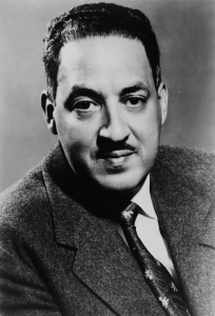Thurgood Marshall was an American civil rights activist with the National Association for the Advancement of Colored People (NAACP) and the first African American to serve on the Supreme Court of the United States. He is remembered as a lawyer who had one of the highest rates of success before the Supreme Court and the principal counsel in a number of landmark court cases. Marshall won 29 of the 32 cases he argued before the high court.
Marshall was born on July 2, 1908 in Baltimore, Maryland, the great-grandson of a slave. His father, William Marshall, a railroad porter, instilled in him an appreciation of the Constitution at an early age. When young Marshall got in trouble at school he was required to memorize sections of the US Constitution. His mother, Norma Arica Williams, an elementary school teacher for 25 years, placed great emphasis on his overall scholarship.
Marshall grew up in Baltimore, graduating from Frederick Douglass High School in the city in 1925 and from Lincoln University in Pennsylvania in 1930. Marshall, who had decided to become an attorney, was rejected by the University of Maryland School of Law in 1930 because of his race. He instead entered Howard University Law School, graduating in 1933. After initially setting up a private practice in Baltimore, he in 1934 began his long history with the NAACP. He won his first major legal victory as an NAACP lawyer the following year on behalf of Donald Gaines Murray, a black student, who like Marshall was also denied admission to the University of Maryland Law School. With that victory Marshall now realized the courts could be a powerful weapon against racial discrimination.
Marshall’s most famous case was the legal challenge on behalf of Linda Brown and twelve other plaintiffs that would result in the U.S. Supreme Court’s landmark Brown v. Board of Education ruling in 1954. Here the high court struck down an earlier Supreme Court’s 1896 ruling in Plessy v. Ferguson, declaring that “separate but equal” public education was unconstitutional. Numerous legal scholars contend that this ruling was one of the most important and far reaching in the history of the U.S. Supreme Court and of the nation.
President John F. Kennedy appointed Thurgood Marshall to the U.S. Court of Appeals for the Second Circuit in 1961. With this appointment Marshall began his career as a jurist. On June 13, 1967 President Lyndon Baines Johnson appointed Marshall to the Supreme Court. He was confirmed as an Associate Justice by the United States Senate by a vote of 69-11 on August 30, 1967.
Marshall served on the high Court for the next twenty four years, compiling a liberal human rights record that included strong support for the civil rights of people of color and for constitutional protection of individual rights, especially the rights of criminal suspects against the government.
Justice Marshall also worked closely with Justice William Brennan in helping to craft the Roe v. Wade Decision of 1973 which supported abortion rights. He also opposed the death penalty. In 1972, Marshall argued in Furman v. Georgia that the death penalty was, in all circumstances, unconstitutional.
During his years on the Court Marshall was often called the silent revolutionary who viewed the United States Constitution was an evolving shield of freedom. In a 1987 speech he gave for the bicentennial celebration of the United States Constitution, Marshall claimed the government the founding fathers devised was defective from the start; requiring several amendments, a Civil War, and major social transformations to attain the Constitutional guarantees and respect for freedoms and individual rights that the nation holds as fundamental today.
Thurgood Marshall was married twice, first to Vivian Burey from 1929 to her death in February 1955 and later to Cecilia Suyat from December 1955 until his death. He and his second wife had two sons.
Justice Thurgood Marshall retired from the Court in 1991 and died in 1993 in Bethesda, Maryland of heart failure at the age of 84.

